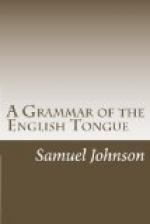13. Trissyllables in ude commonly accent the first syllable, as plenitude.
14. Trissyllables ending in ator or atour, as creatour; or having in the middle syllable a diphthong, as endeavour; or a vowel before two consonants, as domestick; accent the middle syllable.
15. Trissyllables that have their accent on the last syllable are commonly French, as acquiesce, repartee, magazine, or words formed by prefixing one or two syllables to an acute syllable, as immature, overcharge.
16. Polysyllables, or words of more than three syllables, follow the accent of the words from which they are derived, as arrogating, continency, incontinently, commendable, communicableness. We should therefore say disputable, indisputable; rather than disputable, indisputable; and advertisement, rather than advertisement.
17. Words in ion have the accent upon the antepenult, as salvation, perturbation, concoction; words in atour or ator on the penult, as dedicator.
18. Words ending in le commonly have the accent on the first syllable, as amicable, unless the second syllable have a vowel before two consonants, as combustible.
19. Words ending in ous have the accents on the antepenult, as uxorious, voluptuous.
20. Words ending in ty have their accent on the antepenult, as pusillanimity, activity.
These rules are not advanced as complete or infallible, but proposed as useful. Almost every rule of every language has its exceptions; and in English, as in other tongues, much must be learned by example and authority. Perhaps more and better rules may be given that have escaped my observation.
Versification is the arrangement of a certain number of syllables according to certain laws.
The feet of our verses are either iambick, as aloft, create; or trochaick, as holy, lofty.
Our iambick measure comprises verses
Of four syllables,
Most good, most fair,
Or things as rare,
To call you’s lost;
For all the cost
Words can bestow,
So poorly show
Upon your praise,
That all the ways
Sense hath, come short. Drayton.
With ravish’d ears
The monarch hears. Dryden.
Of six,
This while we are abroad,
Shall we not touch our lyre?
Shall we not sing an ode?
Or shall that holy fire,
In us that strongly glow’d,
In this cold air expire?
Though in the utmost peak,
A while we do remain,
Amongst the mountains bleak,
Expos’d to sleet and
rain,
No sport our hours shall break,
To exercise our vein.
What though bright Phoebus’ beams
Refresh the southern ground,
And though the princely Thames
With beauteous nymphs abound,
And by old Camber’s streams
Be many wonders found:




